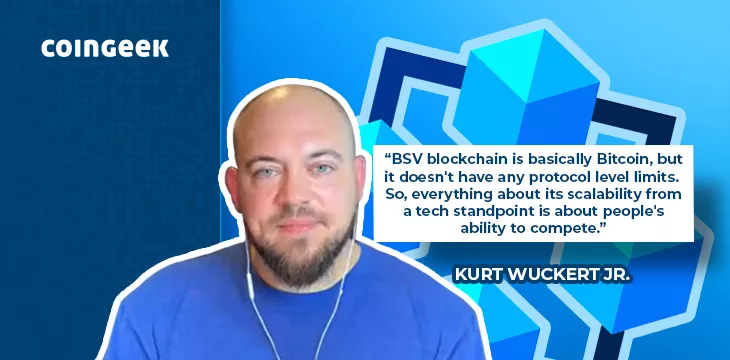|
Getting your Trinity Audio player ready...
|
CoinGeek’s Chief Bitcoin Historian Kurt Wuckert Jr. recently talked to Brad Holland from the 5 Goats podcast about Web 3.0, Bitcoin, and more.
When will Web 3.0 tech become important to everyone?
Holland asks Wuckert when the technologies we associate with Web 3.0 would take center stage.
“If you can’t scale, you can’t function,” Wuckert replies, kicking things off with an allusion to the bigger picture. He tells us that many have had good ideas on Ethereum, but they’re as good as dead from the get-go because they can never work at scale. Ethereum, being an account-based blockchain, can never scale the way Bitcoin does.
What about alternatives like Solana? They’re not trustworthy. Solana has gone down half a dozen times in the last several years, and the developers have simply switched it on and off again. This cannot be the foundation of the new internet.
The blockchain that does scale well is the BSV blockchain. Wuckert and his firm GorillaPool have seen 30,000 transactions per second sustained, and the BSV blockchain will scale much bigger in time. Furthermore, the BSV blockchain is capable of all manner of transactions, making all sorts of use cases possible.
So, to answer the initial question, Web 3.0 can’t take center stage until people unite and begin building on a scalable blockchain.
Even if BSV blockchain is technically superior, will it get adopted?
Holland points out that decision-makers often ignore great technology and adopt something else. He wonders if this might be a possibility for the BSV blockchain.
Wuckert replies that none of the rest are capable of doing what a blockchain needs to do in order to be adopted at scale. Again, he points to Ethereum, noting that it was created to solve a problem; small blockers had kneecapped Bitcoin’s innate capabilities, and Vitalik Buterin wanted to build things.
However, Ethereum doesn’t do anything Bitcoin can’t do, e.g., smart contracts. Its own technical limitations have also given birth to countless other blockchains. Ethereum today is useless apart from novelty purposes, as are most of the others.
Looking at what people are doing now, Holland notes that it’s mostly speculation. Wuckert says people have realized they can collude and pump stocks (e.g., GameStop). Many in digital currency are the same. However, none of this is what Bitcoin was supposed to be about.
What would Wuckert say to a new wave of speculators and investors trying to enter what appears to be a new bull run?
Wuckert says infrastructure is a good bet, but most people don’t consider it. If it is another digital currency bull run, mining rigs will be worth more in a year or so than they are today.
Other than this, he says the “Bitcoin basket” is an option. If you spend over $30,000 for one BTC, you can depoliticize your risk by buying BSV and BCH as well. Better yet, this will only cost you a few hundred dollars.
People are also looking at tokenizing real-world assets on the blockchain. Being able to switch your gains into a safe haven asset would be great. If you make big money on a meme coin, moving it into something safer would be smart.
However, circling back to fundamental value, Wuckert reminds us that this has to scale if it will deliver anything valuable. There has to be one network, uniting everyone to build around one protocol, as happened with the internet. If the BSV blockchain doesn’t work, blockchains are a bad idea and won’t be around in the long-term future.
Unleashing data rebellion: How Web3 is reshaping the Internet

 03-02-2026
03-02-2026 




